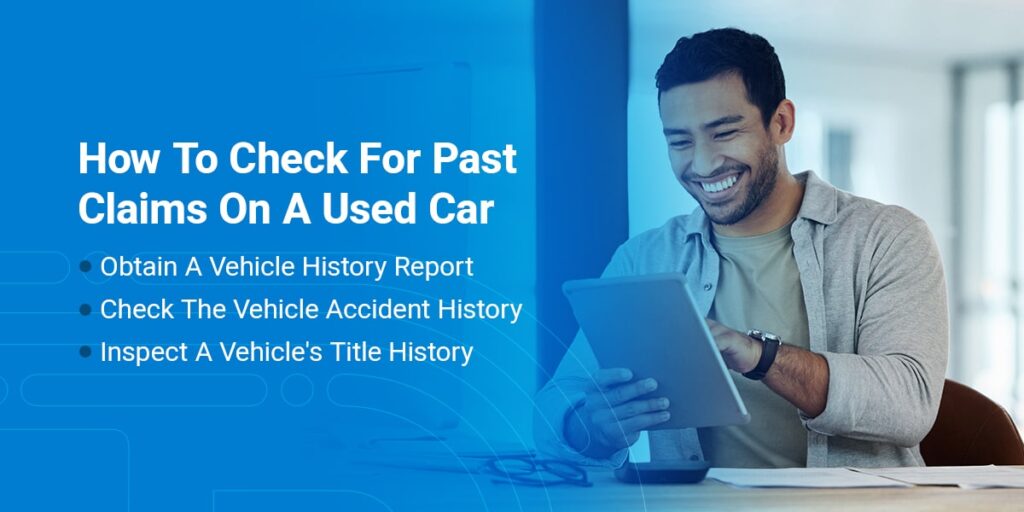
Buying a used car is a strong investment choice. You can save money, experience slower vehicle depreciation and choose from a wide range of models. You might also experience lower insurance rates.
Before you move forward with purchasing a used car, be sure to take the crucial step of checking for claims. A history of claims from previous owners might indicate you should be cautious during the purchasing process. Too many claims might mean the car has low value. When you research the car beforehand, you can make an informed buying decision.
A used car’s exterior and interior conditions can hint at how much care the previous owners provided. Although, this visual assessment will tell you a little about the car’s background. Before buying a used car, you should check the vehicle history report.
The records may include routine maintenance, repairs and accident history. This information can affect your decision to buy the car or how much you should pay.
Researching a used car is the best way to make an educated purchase. It can be tempting to rush into a purchase when you find an ideal model and price, but it’s always best to evaluate the vehicle beforehand.
Here are more reasons why used car research is essential:

One of the best strategies for researching used cars is obtaining a vehicle history report and checking for any past claims. Before you move forward with purchasing a used vehicle, you’ll want to obtain the vehicle identification number (VIN) and the vehicle history report. This document includes many essential details about the car, including:
Contact Us for More Information
Here are important steps to follow to check for past claims:
Get started by checking the VIN on the used car for claims. You can get a vehicle history report from various sources, such as:
Since it’s in the lender’s best interest to make sure any vehicle they finance will be sufficient collateral, they will likely supply a vehicle history report. Sellers can also benefit from providing potential buyers with a vehicle history report because it will save buyers money and build trust. You can also get a vehicle history report on your own by providing the VIN in an online form, such as Carfax, AutoCheck, and the National Motor Vehicle Title Information System (NMVTIS).
When looking at a report provided by a seller or dealer, check that the VIN on the vehicle matches the VIN on the report.
One of the most vital pieces of information you can collect from a vehicle history report is its history of accidents. If the car was involved in an accident that caused structural damage or airbag deployment, you may want to proceed with caution. Have your mechanic assess the vehicle for structural issues and the quality of the repairs. You may also want to ask for documentation of the repairs that were made to the vehicle.
If a vehicle has been in an accident involving fire or flooding, you may want to carefully consider whether the purchase is worthwhile. Both flood and fire damage can cause hidden harm that may compromise your safety and cost you a lot of money later.
You might still determine that the car is worth purchasing. In this case, you may be able to use the accident history and damage as leverage to lower the purchase price. Otherwise, you can walk away and save yourself the headache and expense of buying a damaged car.
A vehicle’s accident history isn’t the only area to examine closely in the vehicle history report. You can also learn crucial information about the vehicle in its title history. In the title history section of the vehicle history report, you may find that the title spans multiple states in a short period. This could be a red flag, signaling that previous owners have tried erasing negative information from a title by moving it between states.
If you find that the vehicle had a salvage title, you’ll also probably want to rethink the purchase. When a vehicle is given a salvage title, it’s deemed a total loss by the insurance company. Then the car gets rebuilt and returned to the road. With these vehicles, buyers tend to risk discovering safety issues and dealing with expensive repairs. If you’re attempting to finance a used car, your lender also may not be willing to give you the loan for a car with a salvage title. If they are willing, you’ll likely encounter a high interest rate.
After checking for claims on a used car, you can make a more informed decision about whether to move forward with the purchase.
In addition to checking an auto insurance claims history report, you can also conduct a physical inspection. By evaluating the vehicle’s physical condition, you can gain more insight into your buying choice.
For instance, you can inspect these used car components:
If you encounter something strange but aren’t sure how to proceed, you can get a mechanic’s opinion on the car’s condition. That way, you can receive expert advice about the car’s value and working condition.
Have you been in multiple small accidents in a short period? Has your car been hit with hail twice in the past month? Whatever your unlucky circumstances may be, you may have found yourself in need of small repairs over multiple incidents. This can lead to a tough decision — do you file a claim with your insurance company?
Before you jump on making a claim, you want to be sure how exactly making multiple insurance claims can affect your policy terms.
Yes, having more than one claim in a three-year period can be a red flag to an insurance company. If you make three or more claims in this time, your insurance provider will note this as “multiple claims.” Having multiple claims can have a negative impact on your insurance rate or even lead to non-renewal from your insurance carrier.
Many drivers wonder if you can reach a number of claims that is too high. This number depends on the at-fault driver and the claim type you file. For instance, claims can vary by:
So what’s the solution if you’re dealing with multiple incidents that leave your vehicle in need of repairs? The most obvious solution to avoiding at-fault claims is practicing more careful driving habits, like:
But some incidents are simply out of our control, making it challenging to understand the best next steps.
Often the preferable option is to pay for the repairs yourself. Go to your auto insurance company for major claims, not small claims. Paying for small damages out of your own pocket can save you money in the long term because your insurance rate won’t increase and you won’t have to pay multiple deductibles. If filing multiple claims in the short term could cause your insurance rate to increase, you’ll likely be better off covering the repairs yourself.

Are you looking to buy a used vehicle and need to update your car insurance? Or do you want to find the best deals for your coverage? For your auto policy, trust a provider with more than 20 years of experience. David Pope Insurance Services, LLC provides families and individuals with insurance policies that will keep them safe and protected. Finding the insurance policy for you is simple and easy when you work with us.
No matter what your unique situation is, we can figure out how to get the right coverage for you at the best premium possible. We can find auto insurance coverage for teen drivers and older drivers.
To learn more about your insurance options or request a quote, contact us at David Pope Insurance Services today.